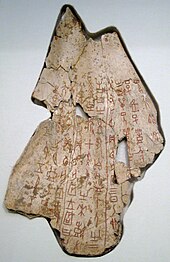Oracle
An oracle is a person or thing considered to provide insight, wise counsel or prophetic predictions, most notably including precognition of the future, inspired by deities.The word oracle comes from the Latin verb ōrāre, "to speak" and properly refers to the priest or priestess uttering the prediction.Other oracles of Apollo were located at Didyma and Mallus on the coast of Anatolia, at Corinth and Bassae in the Peloponnese, and at the islands of Delos and Aegina in the Aegean Sea.[4] At the oracle of Dodona she is called Diōnē (the feminine form of Diós, genitive of Zeus; or of dīos, "godly", literally "heavenly"), who represents the earth-fertile soil, probably the chief female goddess of the proto-Indo-European pantheon[citation needed].Python, daughter (or son) of Gaia was the earth dragon of Delphi represented as a serpent and became the chthonic deity, enemy of Apollo, who slew her and possessed the oracle.When the Prytanies' seat shines white in the island of Siphnos, White-browed all the forum—need then of a true seer's wisdom— Danger will threat from a wooden boat, and a herald in scarlet.Croesus proclaimed the oracle at Delphi to be the most accurate, who correctly reported that the king was making a lamb-and-tortoise stew, and so he graced her with a magnitude of precious gifts."Only the wooden palisades may save you"[citation needed], answered the oracle, probably aware that there was sentiment for sailing to the safety of southern Italy and re-establishing Athens there.Dodona in northwestern Greece was another oracle devoted to the Mother Goddess identified at other sites with Rhea or Gaia, but here called Dione.The shrine of Dodona, set in a grove of oak trees, was the oldest Hellenic oracle, according to the fifth-century historian Herodotus, and dated from pre-Hellenic times, perhaps as early as the second millennium BC, when the tradition may have spread from Egypt.Priestesses and priests interpreted the rustling of the leaves of the oak tree that stood on this spot as Zeus' sanctuary to determine the correct actions to be taken.The opening verse of the Tiruvalluva Maalai, a medieval Tamil anthology usually dated by modern scholars to between c. 7th and 10th centuries CE, is attributed to an asariri or oracle.Contemporarily, Theyyam or "theiyam" in Malayalam - a south Indian language - the process by which a Priest invites a Hindu god or goddess to use his or her body as a medium or channel and answer other devotees' questions, still happens.Among the related Yoruba peoples of the same country, the Babalawos (and their female counterparts, the Iyanifas) serve collectively as the principal aspects of the tribe's world-famous Ifa divination system.In the migration myth of the Mexitin, i.e., the early Aztecs, a mummy-bundle (perhaps an effigy) carried by four priests directed the trek away from the cave of origins by giving oracles.Their written repositories of traditional knowledge, the Books of Chilam Balam, were all ascribed to one famous oracle priest who had correctly predicted the coming of the Spaniards and its associated disasters.The word "oracle" is used by Tibetans to refer to the spirit that enters those men and women who act as media between the natural and the spiritual realms.In the 29-Article Ordinance for the More Effective Governing of Tibet (Chinese: 欽定藏內善後章程二十九條[48]), an imperial decree published in 1793 by the Qianlong Emperor, article 1 states that the creation of Golden Urn is to ensure prosperity of Gelug, and to eliminate cheating and corruption in the selection process performed by oracles.


Oracle CorporationOracle (disambiguation)Consulting the OracleJohn William WaterhouseAnthropology of religionAfterlifeAnimismAuguryCommunitasComparative religionDivinationDivine languageEvolutionary origin of religionFetishismGreat SpiritHenotheismInitiationLaying on of handsLiminalityMonotheismNympholepsyPilgrimagePolytheismRite of passageRitualSacred languageSacred–profane dichotomySacred siteShamanismSoul dualismSuperstitionTheories about religionTranstheismVeneration of the deadCoral Gardens and Their MagicTreatise on the Apparitions ofSpirits and on Vampires or RevenantsNeo-PaganismAngakkuqBabaylanBobohizanJhākriPawangSlametanCargo cultGhost DanceHandsome LakeThe Elementary Formsof the Religious LifePurity and DangerMyth and ritualArchaeology of religion and ritualPoles in mythologyLived religionElite religionAugustin CalmetAkbar S. AhmedTalal AsadJoseph CampbellMary DouglasÉmile DurkheimMircea EliadeArnold van GennepRené GirardE. E. Evans-PritchardJames FrazerFustel de CoulangesClifford GeertzRobin HortonClaude Lévi-StraussRobert MarettSteven OzmentRoy RappaportSaba MahmoodMarshall SahlinsMelford SpiroStanley TambiahVictor TurnerEdward Burnett TylorDaniel Martin VariscoAnthony F. C. WallaceAnthropological Perspectives on ReligionFolkloreThe Hibbert JournalThe Journal of ReligionOceaniaReligionsEthnicfolk religionsAfro-American religionAlaska Native religionBöö mörgölChinese folk religionHanituKejawènNative American religionNoaidiShindoShamanism in SiberiaShintoTengrismTraditional African religionsBuddhismMahayanaNichirenPure LandShingonTheravadaTiantaiTibetanVajrayanaChristianityAdventismAnglicanismArmenian Apostolic ChurchBaptistsCalvinismCatholic ChurchCoptic OrthodoxyEastern OrthodoxyEthiopian OrthodoxyGreek OrthodoxyLutheranismMethodismNestorianismOriental OrthodoxyPentecostalismProtestantism